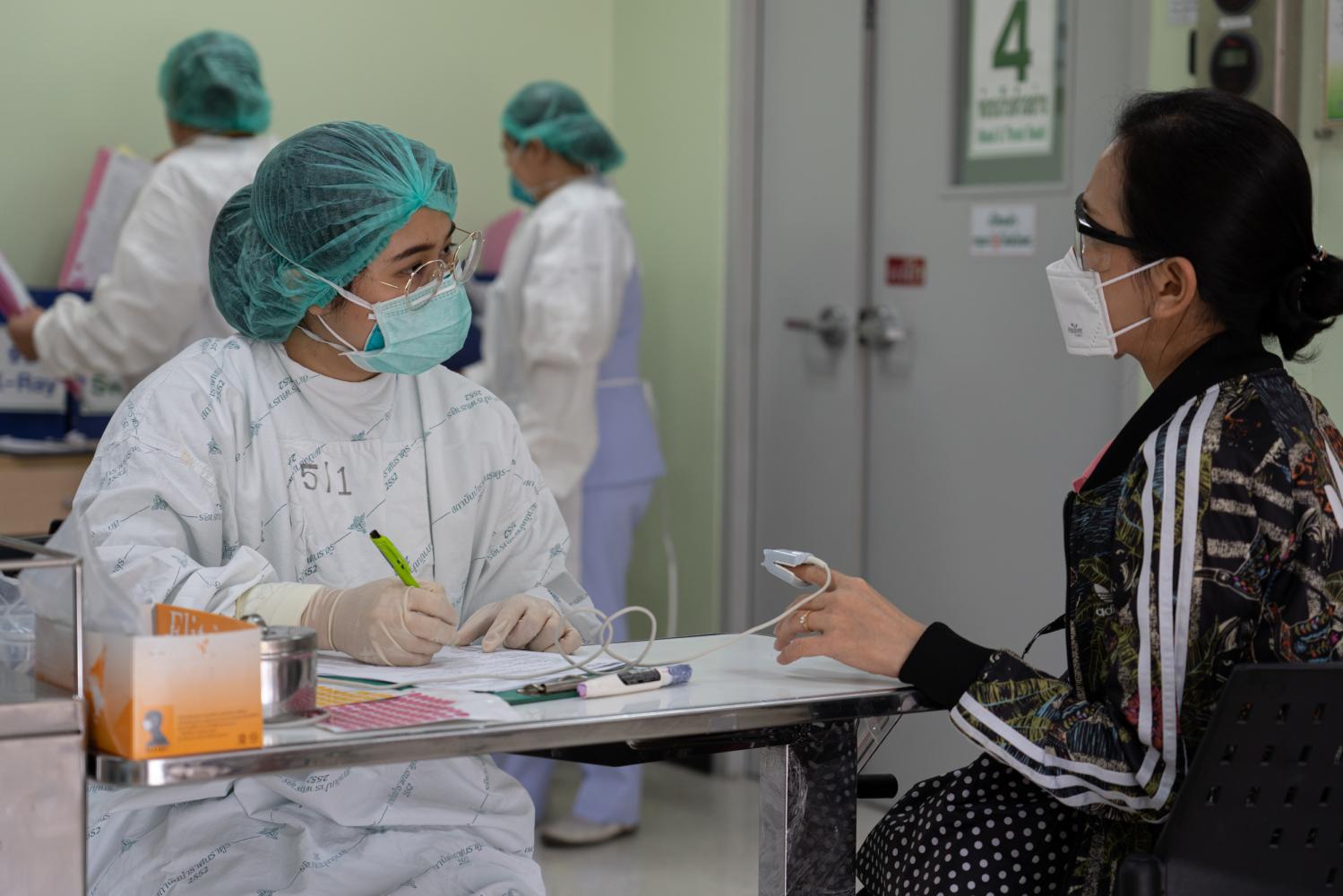
As people stay home to do their bit to combat the Covid-19 pandemic, healthcare workers are vigilant on the frontline, providing treatment and preventing the disease from spreading further.
More than 100 days have passed since Thailand reported its first case. Since Jan 8, medical personnel across the country have been working around the clock -- in some cases, seven days a week -- risking their lives to fight the outbreak, as their work puts in them in constant, close contact with the novel coronavirus.
To better understand how frontline medical personnel work, the World Health Organization (WHO) carried out interviews with several medical staff of Bamrasnaradura Infectious Diseases Institute, who spoke about their concerns.
Thailand's first case
On Jan 8, Jidapa Sujan, a young nurse stationed at the Accidents and Emergency (A&E) department received a phone call asking the institute to pick up a tourist who was suspected of being infected by a "new disease". At that time, the world had not heard of Covid-19.
Ms Jidapa, 28, admitted she was scared of the prospect of dealing with an outbreak.
"I had never faced that level of risk before. I was afraid that I would catch it," Ms Jidapa recounted.
The novel coronavirus had been reported as "severe viral pneumonia". As medical experts didn't know what caused it, no one knew how to prevent it. And the Department of Disease Control under the Public Health Ministry had only recently acknowledged a new contagious disease spreading overseas.
After the call, Ms Jidapa put on Personal Protective Equipment (PPE), which consisted of an overall, N95 mask, goggles, face shield, hat, as well as plastic socks, boots and gloves.
Ms Jidapa recalled how one of her colleagues helped ensure her PPEs were in order before she stepped into the ambulance with her team. Their destination was Suvarnabhumi Airport, and their task was to pick up a sick Chinese tourist -- Thailand's first Covid-19 patient.
"All the nurses were afraid to collect Covid-19 patients. It was impossible to not [be scared]," she said.
"Regardless of how we feel, we have to focus on the job at hand. We have to prepare our pick-up plan, set up a team and ensure whoever is involved had the best PPE available," added Ms Jidapa, who has gone on to pick up more Covid-19 patients since then.
Medical staff have to follow strict disease control protocols, as no vaccine for the disease has been found.
"Each time, after every pick-up, I would monitor my health by taking my temperature twice a day for 14 days," said Ms Jidapa.

Nurses at Bamrasnaradura Infectious Diseases Institute talk to patients who are being traced for Covid-19. photos by Pathumporn Thongking
'Unusually taxing'
Bamrasnaradura Infectious Diseases Institute is a specialised hospital caring for patients with highly-contagious diseases. The institute, under the Ministry of Public Health, has been at the centre of every effort to control outbreaks of diseases in the country.
Nurses and doctors there are familiar with outbreaks, but even they said the novel coronavirus is unusually taxing.
Arom Disthakumpa, chief of the institute's Isolation Ward who has 37 years of experience in dealing with infectious diseases, called it "unique".
"I've never before faced a situation where waves of patients come in like this. Our institute had treated patients with Sars [Severe Acute Respiratory Syndrome], Mers [Middle East Respiratory Syndrome] and even Ebola," said Ms Arom. "This disease is frightening as it spreads quickly."
But to Ms Arom and her colleagues, any outbreak is a job which requires their utmost focus.
"When I see the patients, I feel sorry for them. It makes me want to do my best to protect them," she said.
Safety first
As the mainstay in the country's fight against the outbreak, Bamrasnaradura Infectious Diseases Institute is equipped with medical resources fit for the task. Suttiporn Teruya, deputy director of the institute's Nursing Affairs, said the institute orders PPEs in advance.
"We counted how many pieces of PPE we used in a single day. Initially, we prepared enough for one month," she said. "When the disease started to get more widespread, we increased our reserves to cover three months, and now we are re-assessing again."
To prevent accidental transmission, medical staff were also trained to be alert to potential risks. "We have to assume all the patients we serve have Covid-19, so we have to protect ourselves, by wearing N95 masks or at the very least, surgical masks," said Ms Jidapa.
In addition to being cautious, staff were also trained to use PPE correctly -- and wisely.
For instance, Ms Jidapa said when she and her colleagues have their PPEs on, they would work for four hours straight so they won't have to change and discard their PPEs too frequently.
Fighting spirit
The pandemic has forced medical personnel all over the world to work overtime, and Ms Jidapa was no different. She had planned to visit her parents in the North for Songkran, but instead she has to work extra hours.
"I told them I have to work for the country," said Ms Jidapa.
Khuanjai Monthaisong, another nurse at the institute, said passion and commitment have helped them endure a heavy workload and health risk.
"Everyone has a fighting spirit and we work as a team. My family understands what I'm doing. The biggest encouragement we get is the support of ordinary people, on social media, and from those who come to see us."
Around the world, Covid-19 has cost the lives of many healthcare workers and Ms Arom hopes that as this global event unfolds, all healthcare workers in Thailand will receive sufficient PPEs, better risk payments and life insurance.
Daniel A Kertesz, WHO representative in Thailand, believes Thais can play a bigger role in containing the outbreak by following hygiene and social distancing guidelines.
"We can protect ourselves and those around us," he said.
The story was supplied by the World Health Organization Thailand (WHO Thailand).